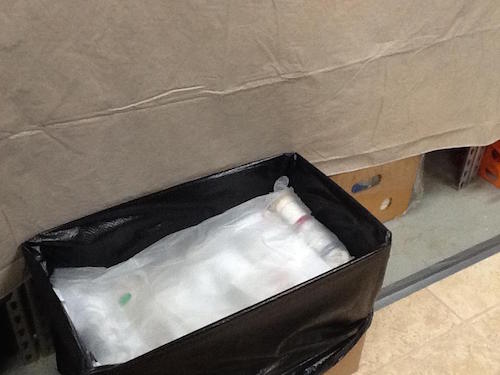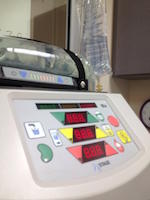Ten Tried & True Tips For Home Dialysis Training
A survival manual for care partners
During training, your normal daily routine does not cease. Clothes will still need to be washed. Groceries will still need to be bought and cooked. Trash will still have to be taken out. In fact, with home treatment—you’ll see that trash will MULTIPLY! With all this in mind, know that planning is your new best friend. Below, you’ll find some tips that will help you navigate the new shores of home treatments. While this was written for people doing home hemodialysis (HD) training, most of the tips are useful for peritoneal dialysis (PD) as well. There are changes coming for you—and when you see how much better your loved one feels, you’ll know that they are all worth it.

Tip #1: Go grocery shopping before you start training!
Training can be physically and mentally taxing. While it is vital, it can be tiring to learn so much new information at one time! (It’s been a while since you were in school and had tests to take, right?)
Plan ahead. Buy food for meals that can be heated up or cooked in the microwave. Home training is a journey that makes eating healthy a challenge. It happens in a short time frame, and if you don’t have food on hand for healthy meals and snacks, it is hard to eat well. Fresh fruit, veggies, and nutritious meals do not just appear! If you have friends who want to help, or a church group, this is a great time to ask for meals. Be specific about what you or your loved one can or can’t eat, so you don’t get casseroles made with salty canned soup, mashed potatoes, or pans of lasagna.
Diet advice for the patient: Watch out for canned foods—they tend to be high in sodium. Frozen is better, but nothing beats fresh!
If you can be creative while following a special meal plan, you can make it taste good. Use fresh or dried spices and seasonings (read labels for salt). And there are many kidney friendly recipes online. Bring a bottle of water to your training sessions, too. There are few breaks.
Tip #2: Read the book!
The book may not be at your grade level. But, if you knew about dialysis and what it was going to entail, you wouldn’t need any training. Be patient: it will all make sense in time.
Tip #3: Stay rested
Rest is key to successful training. If you are tired it's hard to listen. It’s also hard to comprehend and retain all the things the trainers are going to stuff into your mind. This is your loved one’s life we're talking about. This training is THE most important thing you may ever do!
Take care of yourself. Find some "me" time, even if it's only a few minutes. Chill out with some music, read a novel, try deep breathing, yoga, or anything that can give you a quick mental break.
Tip #4: Take lots of notes!
You are going back to school! Listen VERY closely, take detailed notes, and follow the steps your trainers will give you.
Make note cards, flash cards, and/or come up with your own shorthand! Do all you can to reduce stress and help you understand.
Tip #5: Ask, Ask, Ask
Your trainers know what they are doing, they do it well, and they do not think any questions are dumb or stupid. You must ask questions! This cannot be stressed enough. Ask to get clarity, ask until you understand, and ASK AGAIN. Your trainer WANTS you to succeed and is rooting for you!
Tip #6: Find a great hand lotion!
Nurses are used to continual hand washing. Then, there are the rest of us. You may think you know how to wash your hands, and wash them again, and wash them again. But add a good supply of industrial strength hand lotion to your next shopping list. All that hand washing will make your hands red and chapped. They may even crack. Hand lotion will be your best friend.
Look for one that says healing or extra strength.
Tip #7: Cannulation? Just Do It!
Learning how to put in needles is a scary thought—but that's the key word: THOUGHT. There is nothing that can really prepare you for this. You—or, far better, your loved on on dialysis—need to be able to do it. You will get the hang of it. If you faint at the sight of needles or blood, these articles may help:
- Dialysis Needle Fear - Easing The Sting
- Dialysis Needles, Self-Cannulation And The Buttonhole Technique
Tip #8: Have a Pity Party (once in a while)
As you head into a new world of tubes, blood, needles, etc., having a rare day of self-pity can boost your mental health. You may think that if you make a mistake, it's dire. “I might kill him—either by accident or on purpose!” But really, don't waste too much time with self-pity. Afterwards, take a deep breath, suck it up, and keep going on your journey.
Tip #9: Fill empty supply boxes with dialysis trash
Trash. It breeds! It multiplies! It takes up precious space! Boxes, boxes, boxes. Where were they when you needed to ship gifts? All of the supplies come in boxes. The stock price in box companies must be rising daily, if you judge by the number of boxes you will have.
But take heart! Use those boxes! I stand up the flaps on a supply box, line it with a trash bag, and fill it with trash from the treatment. Go green!

Tip #10: Enjoy the freedom!
 One of the best parts of home dialysis is your new FREEDOM OF CHOICE! You're no longer locked into a set time or
schedule. YOU control when you treat. Plus, you are at HOME with your creature comforts and your STUFF. Goodbye
impersonal, cold, in-center hours, that hard chair, and tiny TV. With walkie-talkies, iPads, etc., you may be
able to get things done around the house!
One of the best parts of home dialysis is your new FREEDOM OF CHOICE! You're no longer locked into a set time or
schedule. YOU control when you treat. Plus, you are at HOME with your creature comforts and your STUFF. Goodbye
impersonal, cold, in-center hours, that hard chair, and tiny TV. With walkie-talkies, iPads, etc., you may be
able to get things done around the house!
CONCLUSION—and a bonus tip!
You can do this. Your clinic would not have let you into the program if they did not think you could succeed. Your training nurse is your ally. If it takes a bit longer, so be it. The rewards are more than worth it.
Bonus tip: When all else fails—call tech support!

Equipment. Just when you think you know what you are doing, you may hit a snag. Never fear, Tech Support is here to save the day! Use it (that's why they're paid the big bucks). Your nurse will appreciate the extra sleep!
Tech folks are patient, informative, and kind. They will smile as they walk you through steps you are too embarrassed to tell your trainer you forgot. And, it is uplifting to find out that you aren't the only one out there who has problems.
The key point is that there is always an answer, and you can find it.

